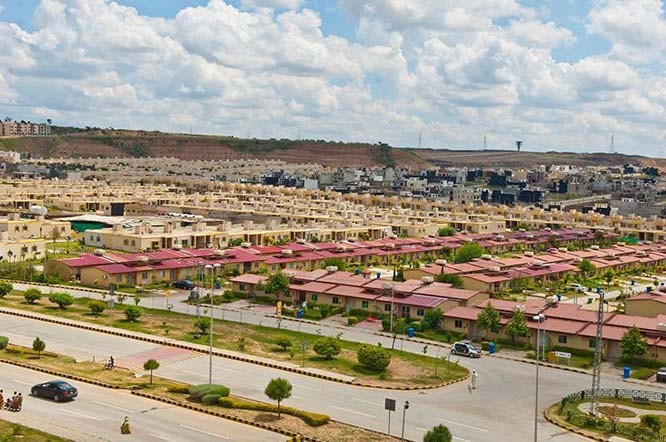
To ensure success of the proposed housing scheme, the PTI government must first regulate the real estate sector

Prime Minister Imran Khan’s flagship project of building five million new residential units is viewed as a critical milestone by his supporters. But will this ambitious project really materialise? There is plenty of room for skepticism.
The federal government has already started to lure investors, in Pakistan and abroad, to pump money into this unregulated sector of the economy. It has also launched a crackdown against illegal occupants from Peshawar to Karachi. Yet, so far at least, the Pakistan Tehreek-e-Insaf (PTI) has nothing significant to demonstrate as progress. Except, perhaps, the commitment made by British-Pakistani property tycoon Aneel Musarrat to convince around 8,000 UK property developers to invest in Pakistan’s real estate market. "Imran Khan has given me this task. I’d live up to his expectations," he told the media.
The government is trying to engage with top 10 real estate investors, like Bahria Town.
The proposed housing scheme is expected to develop 10 per cent high-end properties (1 high priced unit) costing Rs20 million each; 20 per cent upper-mid level properties (1 high medium unit) costing Rs10 million each; 20 per cent mid-level value properties (1 small medium unit) costing Rs0.5 million each and 50 per cent lowest value properties (smaller unit) costing Rs0.2 million each.
Pakistan faces a backlog of 8.5 million units, which is increasing by 250,000 units annually, because of the unmet demand. Looking back, the PPP failed to build the promised 20,000 residential units during its previous tenure (2008 to 2013). The PML-N performance was no better between 2013 and 2018. It bombed its own manifesto, where it pledged to build 1,000 clusters of 500 houses each across the country.
No major housing scheme has been launched by the federal government in the country in the past two decades. Even among those that exist, based on the findings of a Federal Investigation Agency (FIA) report, more than 6,000 of total 8,767 housing/cooperative societies are "unregistered, illegal, ghost and have fake paper". Only 701 of them, and that too on orders of the Supreme Court, have been audited. 70 per cent business of real estate market is being run on bogus documentation.
Officials of the National Accountability Bureau (NAB), FIA and Revenue departments, who have access to official records of such societies, claim that over 4,000 cases of fraud, cheating and irregularities worth around Rs300 billion are presently being investigated on orders of the apex court.
Acclaimed architect, Arif Hasan, sees a serious methodology problem in this newly announced project. Raising serious questions on land acquisition and funding, he says, "The government will have to come up with new legislation to get rid of speculation by regulating builders and developers. House building finance must be released to deserving applicants and new ideas must be branded."
Hasan suggests that the government, without using the push-factor, must convince people to prefer rural over urban planning schemes.
To encourage an investment of Rs1500 billion every year until 2023, experts estimate, the government must engage the public with the private.
FIA officials engaged in the process reveal that they have proposed to the government to form a central authority, similar to SECP and PMDC, to register developers and societies to regulate the private equity investment in real estate. They say the federal government should engage with provincial governments to encourage legal and fair development.
FIA Director CTW, Dr Mazhar-ul-Haq, who was first assigned by the government to look into the unregulated real estate sector, says, "Real estate sector has now become very powerful. The State must put it on the right footing sooner than later," continuing that the country has no central body or authority or council to regulate developers/builders, real estate market and housing/cooperative societies at the moment.
Property consultants assess worth of the real estate market to be between Rs15-20 trillion, and expect this volume to rise to Rs25 trillion by 2025. This represents roughly 5 per cent of the country’s total GDP, according to estimates collected from two major real estate companies.
With property tycoons’ point of view, TNS has learnt that 2,767 registered housing/cooperative societies were either registered under Companies Ordinance 1984 with the Securities and Exchange Commission of Pakistan or districts’ development authorities like CDA, LDA, KDA, MDA while some of the companies are registered under Cooperative Societies Rules, 1927. Mostly housing projects are undertaken either by firms registered under partnership act or some individual as sole proprietor, revealed FIA report. By-laws of housing society, taxation laws, etc are other tools to deal with this unregulated business.
Economist Ishfaq Tola says the real estate sector generates Rs20 billion as direct and around Rs50 billion as indirect taxes. "Property business should be regulated. The real estate market must be corrected in the country," he says.
Prime Minister’s Advisor on Media, Iftikhar Durrani says the government has kept all the doors open for investors. "Our taskforce is working on this project. This dream will materialise."